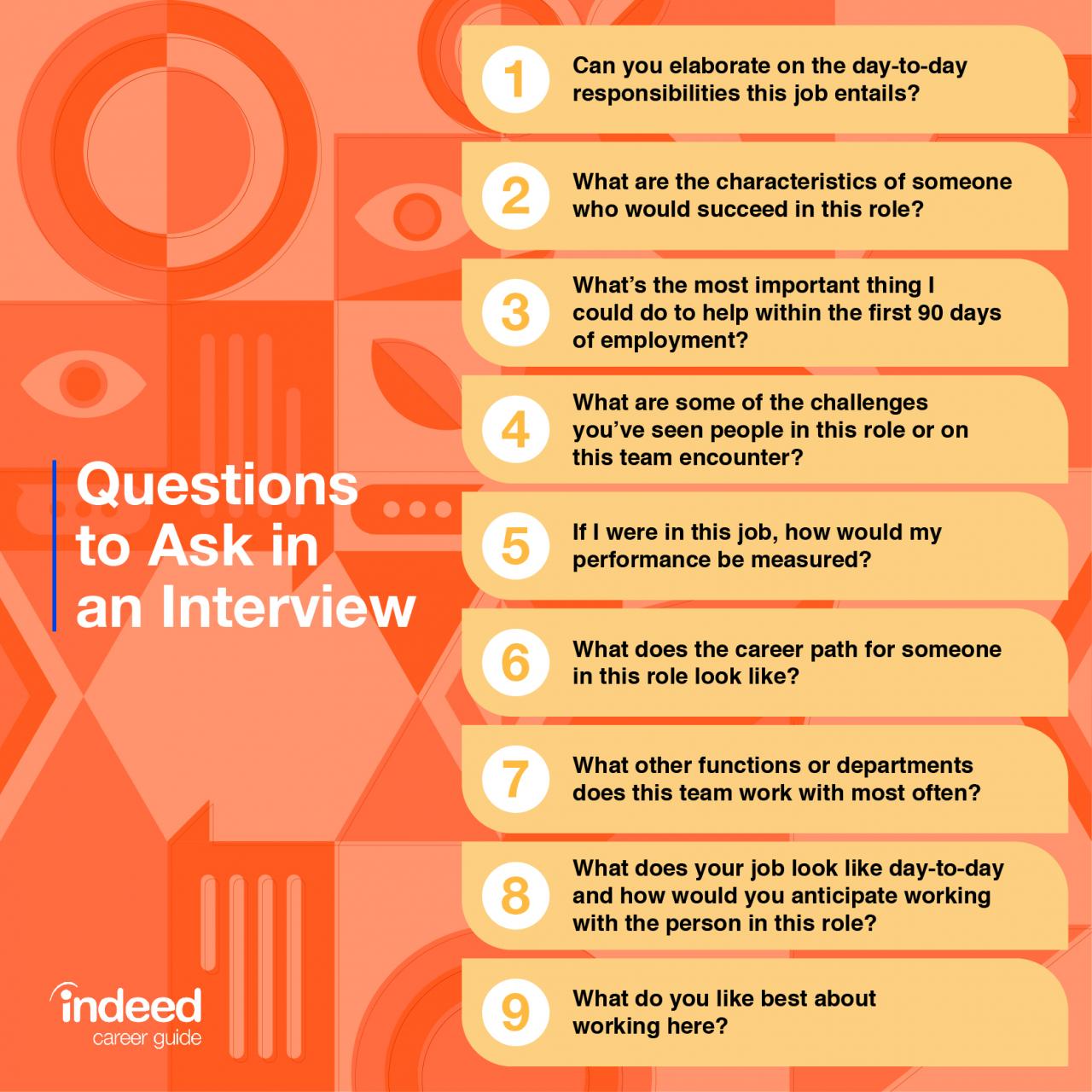10 questions to ask for an interview – Prepare to impress in your next interview with our comprehensive guide to the 10 most effective questions to ask. Asking the right questions not only shows your interest and engagement but also helps you evaluate the company’s culture and values.
From understanding the company’s mission to gaining insights into the team dynamics, these questions will empower you to make an informed decision about your potential future workplace.
Interview Preparation
Preparing thoroughly for interviews is crucial for success. By taking the time to research the company, the role, and potential interview questions, you can boost your confidence and increase your chances of making a positive impression.
To prepare effectively, follow these steps:
- Research the company: Visit the company’s website, social media pages, and industry news sources to gather information about its mission, values, products or services, and recent developments.
- Research the role: Carefully review the job description and identify the key responsibilities, skills, and qualifications required for the position.
- Practice common interview questions: Familiarize yourself with typical interview questions and prepare thoughtful answers that highlight your skills and experience.
- Prepare questions for the interviewer: Asking insightful questions at the end of the interview demonstrates your interest in the role and the company, and gives you an opportunity to clarify any details.
Common Interview Questions

Employers often ask a range of common interview questions to assess candidates’ qualifications, experience, and fit for the role. Here are some of the most frequently asked questions:
- Tell me about yourself.
- Why are you interested in this position?
- What are your strengths and weaknesses?
- Why should we hire you?
- What are your salary expectations?
- What are your career goals?
- Can you tell me about a time when you faced a challenge and how you overcame it?
- Do you have any questions for me?
Answering these questions effectively requires careful preparation, highlighting relevant skills and experiences, and demonstrating enthusiasm for the role.
Behavioral Interview Questions
Behavioral interview questions are designed to assess candidates’ past behaviors and experiences to predict future performance. These questions typically start with “Tell me about a time when…” and focus on specific situations and actions.
To answer behavioral interview questions effectively, use the STAR method:
- Situation: Briefly describe the situation or context in which the event occurred.
- Task: Explain the task or challenge you faced.
- Action: Describe the specific actions you took to address the task.
- Result: Explain the positive outcomes or impact of your actions.
Technical Interview Questions: 10 Questions To Ask For An Interview
Technical interview questions are used to assess candidates’ technical skills and knowledge related to the specific role. These questions can vary widely depending on the industry and position.
To prepare for technical interview questions, review the job description and identify the relevant skills and technologies required. Practice solving common coding problems and be prepared to discuss your experience with specific software or tools.
Questions to Ask the Interviewer
Asking thoughtful questions at the end of an interview demonstrates your interest in the role and the company. It also gives you an opportunity to clarify any details and show that you’re engaged in the conversation.
Here are some questions to consider asking:
- Can you tell me more about the day-to-day responsibilities of this role?
- What are the company’s goals for the next year?
- What are the opportunities for professional development and growth within the company?
- What is the company culture like?
- Is there anything else I can provide to support my application?
Body Language and Nonverbal Communication
Body language and nonverbal cues play a significant role in interviews. Maintaining positive body language can enhance your credibility and make a good impression.
Here are some tips:
- Make eye contact with the interviewer.
- Maintain an upright posture and avoid slouching.
- Use gestures and facial expressions appropriately.
- Dress professionally and appropriately for the role.
- Avoid fidgeting or nervous habits.
Follow-Up After the Interview
Following up after an interview is essential for expressing your continued interest in the role and demonstrating your professionalism. Send a thank-you note within 24 hours of the interview, reiterating your interest and highlighting your key qualifications.
If you don’t hear back within a week or two, you can follow up with a brief email or phone call to inquire about the status of your application. Be polite and respectful, and avoid being pushy.
Final Review
Asking thoughtful questions during an interview is a powerful way to showcase your professionalism, enthusiasm, and attention to detail. Remember, the questions you ask reflect not only your curiosity but also your genuine interest in the role and the company.
So, come prepared with these 10 questions and leave a lasting impression on your potential employer.
FAQ Corner
Can I ask about the company’s growth plans?
Yes, this question demonstrates your interest in the company’s future and your potential role in its growth.
What are the opportunities for professional development within the company?
Asking this question shows that you are ambitious and eager to grow within the organization.
Can you describe the company’s culture and values?
Understanding the company’s culture is crucial to ensure that it aligns with your own values and work style.
What are the company’s biggest challenges and how are you addressing them?
This question demonstrates your analytical thinking and interest in the company’s success.
What are the expectations for the first 90 days in this role?
Asking this question shows that you are eager to make a significant contribution and understand the company’s expectations.